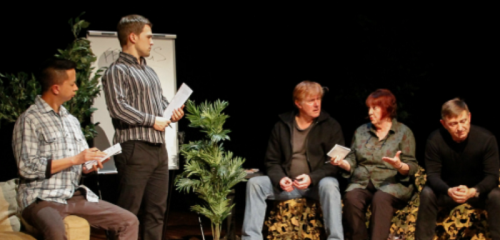
Theatre / “Foxholes of the Mind”. Directed by Wolf Heidecker for Wham theatre, Courtyard Theatre. Season closed. Reviewed by SAMARA PURNELL
Trish has had enough. After 30 years of marriage, she is fed up with the drunken, abrasive, and distant behaviour of her husband, Vietnam veteran Frank, and wants out.
Any hope of sensitive, empathetic or receptive communication from either party seems long gone, along with the two eldest kids, having left home as soon as possible due to their father’s behaviour.
The youngest son, Billy, requires full-time care. Finally, Frank has decided to attend a course for war veterans, despite his disdain for this sort of stuff. This is where “Foxholes of the Mind” begins – a journey to understanding, making and losing friends, facing the past and deciding if any relationships and hope are redeemable moving forward.
Bernard Clancy wrote “Foxholes of the Mind” to premiere in 2010, with the objective of raising awareness that help for defence personnel is available and worthwhile. It was also to shine a light on the mental and emotional wounds that can be suffered in the form of post-traumatic stress disorder by war veterans and those working in the field, as well as the consequences of it on the families at home.
The PTSD course Frank attends, with fellow vets, aims to explain and unpack the training from the Army to “dehumanise” its soldiers, creating an emotionless, attack and kill response that doesn’t bode well for civic life or those around the returning servicemen and women.
The butcher’s paper on display still reads “PTSD course 2010” despite the recent addition by Clancy, of a younger character, Nigel (David Lih) – a Vietnamese-Australian who has fought in Iraq and Afghanistan. Nigel’s role in the play is conflicted – he is an aide to the psychologist convenor, but really is more of a participant.
Sheila, a former nurse, is one of the attendees. As an important and insightful inclusion, Sheila is dedicated and receptive to the program. Maureen Hartley gives a wonderfully natural, nuanced performance, balancing out the anger, cynicism and crass blokiness of the rest of the group. Three characters are played simultaneously by Adrian Mulraney, who physically embodies each effectively.
Victor Gralak as a youthful Mark, portrays the psychologist as prim, smug and robotic, culminating in seeming to encourage the continuation of an abusive relationship as well as coming very close to a breach of confidence that was hard to watch. The script does no particular favour to this character, without a lot to work with.
The play is weighed down with a lot of slogans, slang, army quotes and references to bureaucracy, often at the expense of more engaging and satisfying conversations, with interjections as opposed to interactions. The lack of post-care and even disastrous oversights by the Army, which may or may not be anecdotal, is well-portrayed.
The staging was effective in its simplicity, with smooth transitions between scenes and locations. The camouflage mesh over the seats in the classroom was a striking and clever addition to the props. Short snippets of music used between scenes to represent the Vietnam war music was fitting but didn’t add significantly to the atmosphere of the play.
The examination of generations of veterans demonstrates that although there are differences in the landscapes they fought in, the weapons used, how wounds were inflicted and what prescribed or self-medicating methods may be used to cope, they face the same fears and losses.
For some the slippery-slope of medications and the terror of nightmares, others a life with the label of “totally and permanently incapacitated”.
Huge revelations from Trish come out in the final scenes of the play and Clancy’s play, under Wolf Heidecker’s direction, does not have its characters, or the audience, wearing rose-coloured glasses or under any assumptions that everything will be fine. But between the PTSD course and counselling, the participants leave with a new perspective, bonds of friendship and some hope of joy and purpose in the future.
The play resonates on many levels, including in the discussion of the systemic problems in the Defence Force and government departments. It leaves an enduring question, difficult for many but especially for the characters here – “Who am I?”
Who can be trusted?
In a world of spin and confusion, there’s never been a more important time to support independent journalism in Canberra.
If you trust our work online and want to enforce the power of independent voices, I invite you to make a small contribution.
Every dollar of support is invested back into our journalism to help keep citynews.com.au strong and free.
Thank you,
Ian Meikle, editor




Leave a Reply